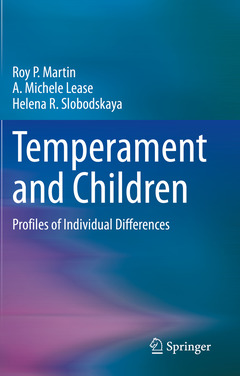Temperament and Children, 1st ed. 2020 Profiles of Individual Differences
Auteurs : Martin Roy P., Lease A. Michele, Slobodskaya Helena R.

The book presents an empirical model of commonly occurring individual differences in children that is derived from a large-scale research effort assessing parental and teacher perceptions of children in middle childhood. It examines eight characteristic behavioral traits, most of which have been widely shown to be present in infants, toddlers, and preschool-aged children. The book demonstrates the importance of considering profiles of these relatively stable individual differences for the educational, social, and emotional life of the child. It describes characteristic behaviors of children within each profile ? emphasizing the assets and liabilities of each ? and how they are perceived by their parents, teachers, and peers. Chapters explore issues related to the most developmentally effective management of children exhibiting each profile type.
In addition, the book addresses a critical need in child development, parenting, and teaching to understand the wide range of individual differences observed every day in school-aged children. Not only does this volume underscore that commonly occurring differences can be understood as being normal and do not suggest a pathology, it also discusses implications of the model in diagnosing pathology. The book describes what is known about the stability of temperament behaviors and profiles across the lifespan as well as the origins of these behaviors.
Key topics addressed include:
- Nurturing development of well-adjusted children.
- Causes of individual differences in children?s behavior.
- Temperamental tendencies and profiles of children.
- Diagnosing psychopathology in children.
This book is a must-have resource for researchers, professors, and graduate students as well as clinicians and related professionals in developmental, clinical child and school psychology, social work, public health, pediatrics, family studies, educational psychology and counseling, and all other interrelated disciplines.
Roy P. Martin, Ph.D., obtained his doctorate from the University of Texas at Austin and has taught doctoral students in educational and school psychology at Temple University (Philadelphia) and The University of Georgia. His primary research interests have been in the areas of social/emotional development, temperament, and early environmental factors that affect social and emotional development. He has written widely on temperament and personality assessment.
A. Michele Lease, Ph.D., obtained her doctorate from the University of Illinois in clinical psychology with specialization in developmental psychopathology. She has taught clinical aspects of child psychology at the University of Georgia in the department of Educational Psychology. She has written extensively in the areas of peer relationships and their effect on educational and mental health outcomes. She studies aggression, peer influence, social status, and the formation of cliques in middle childhood.
Helena R. Slobodskaya, M.D., Ph.D., D.Sc., obtained her original training in medicine obtaining an M.D.; then, secured two doctorates, one in human physiology and the other in personality psychology. She is currently Professor and Principal Research Scientist at the Scientific Research Institute of Physiology and Basic Medicine, Novosibirsk State University, Russia. Her primary research interest currently is the personality development of children and adolescents.Examines eight characteristic behavioral traits in infants, toddlers, and preschool-aged children
Explores the individual differences profiles and their importance in understanding the educational, social, and emotional life of the child
Emphasizes assets and liabilities of each temperament profile
Describes the stability of temperament behaviors and profiles across the lifespan as well as the origins of these behaviors
Date de parution : 12-2021
Ouvrage de 286 p.
15.5x23.5 cm
Date de parution : 12-2020
Ouvrage de 286 p.
15.5x23.5 cm
Thèmes de Temperament and Children :
Mots-clés :
Academic achievement and child temperament; Attention and child temperament; Average children and temperament; Behavioral profiles and child temperament; Compliance and child temperament; Emotion regulation and child temperament; Family and child temperament; Individual differences and child temperament; Latent profile analysis and childhood temperament; Motivation and child temperament; Motor behavior; skills and child temperament; Peers and child temperament; Prosocial behavior and child temperament; Psychopathology and child temperament; Self-regulation and child temperament; Siblings and child temperament; Social status and child temperament; Temperament and middle childhood; Well-adjusted children and temperament; Withdrawn; shy children and temperament



